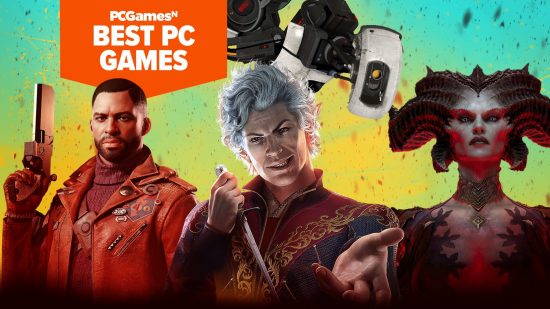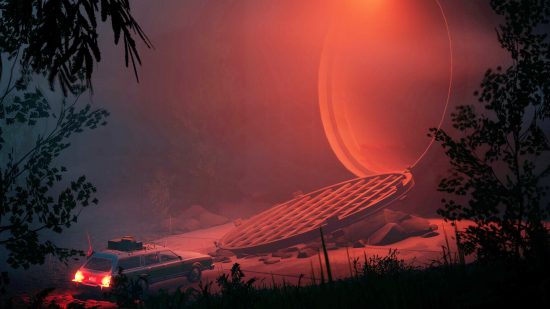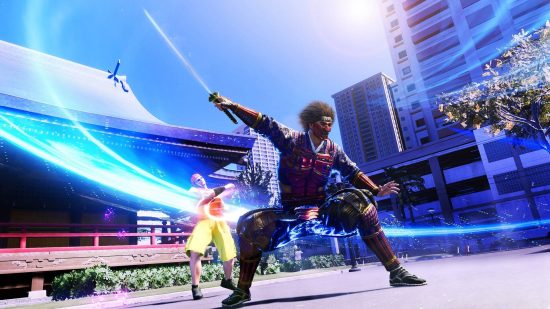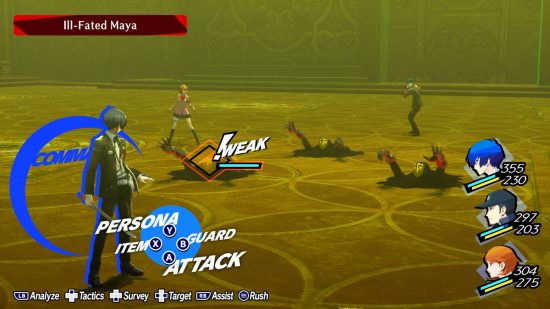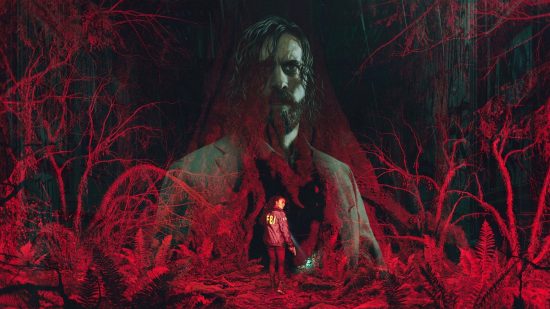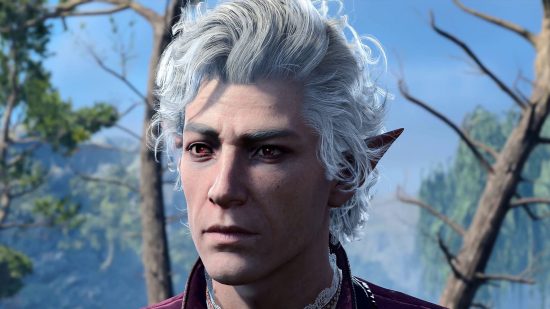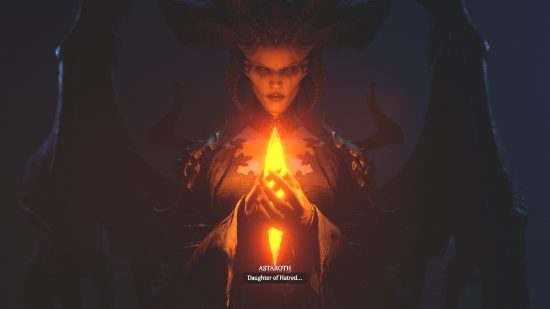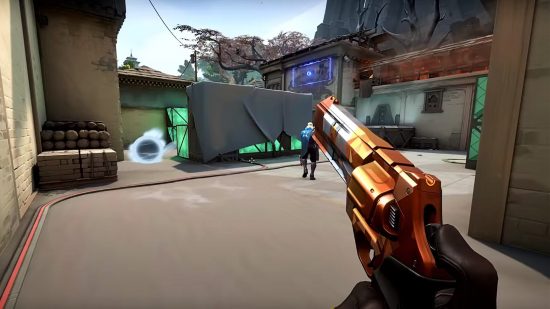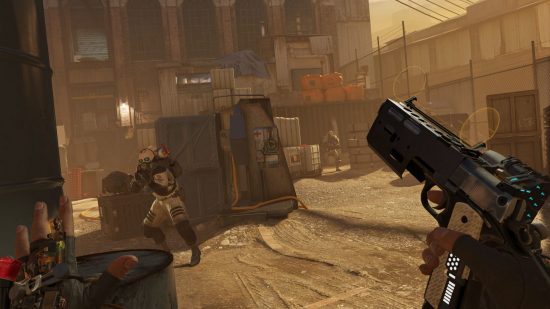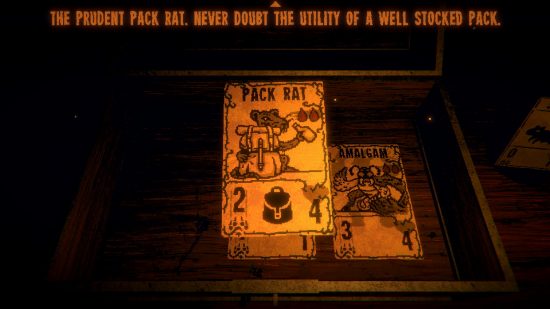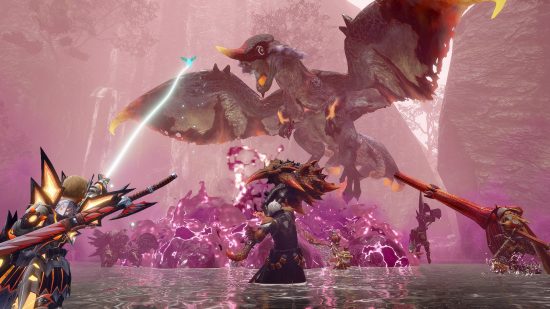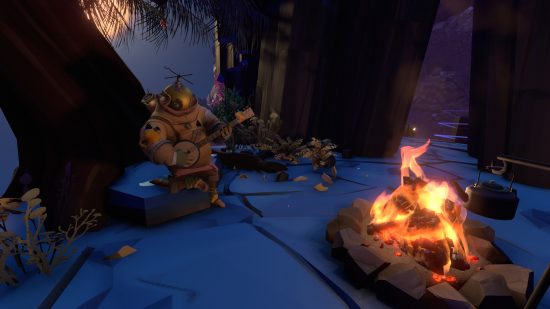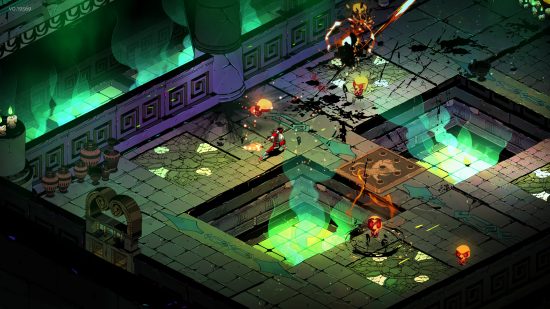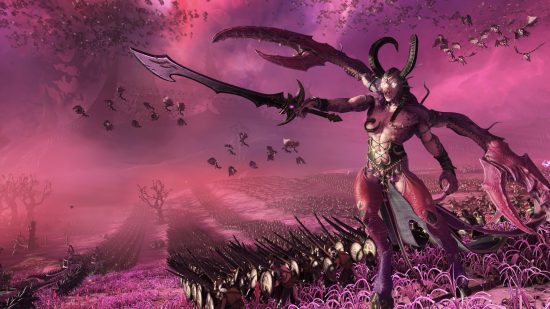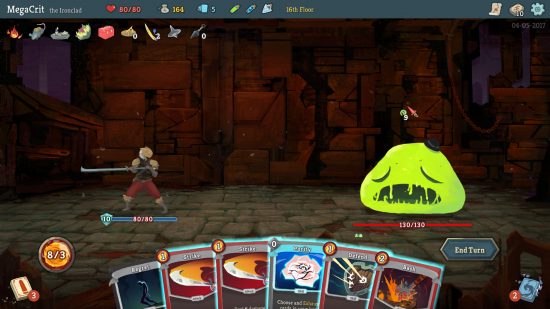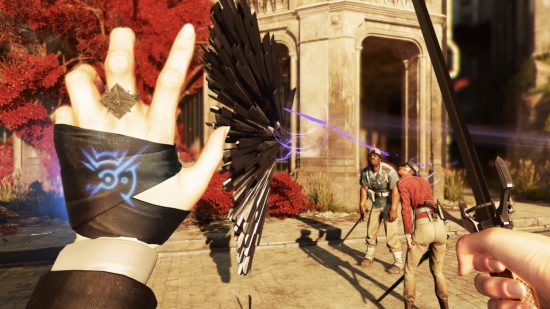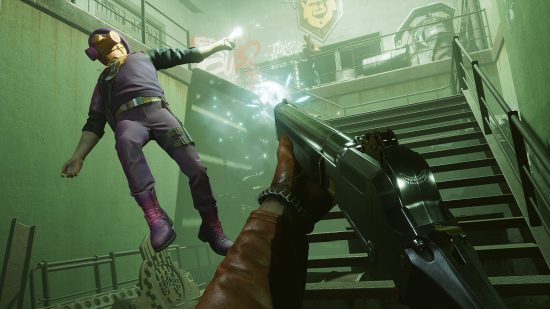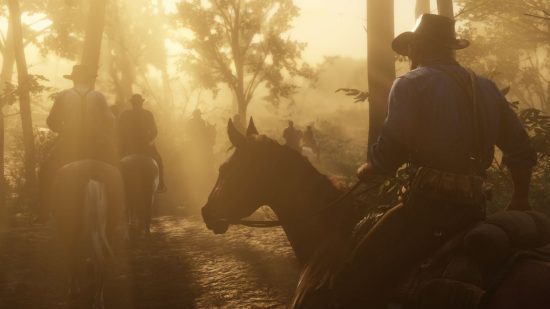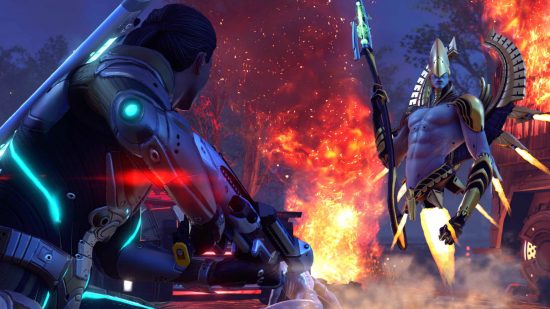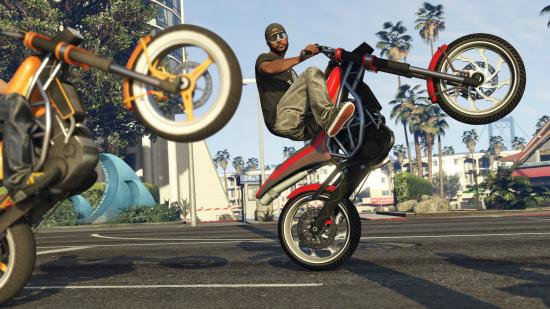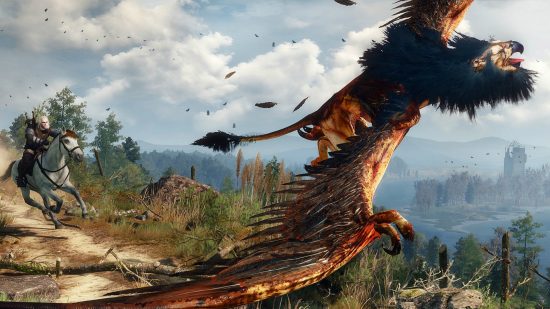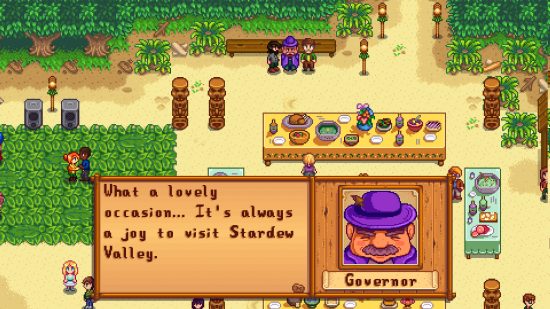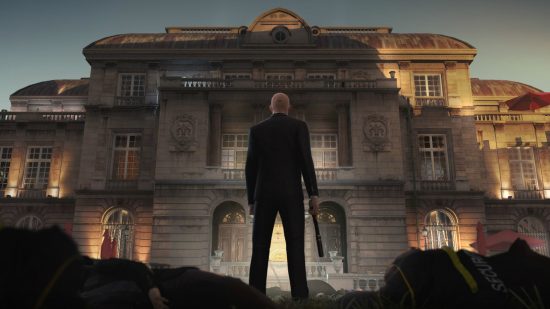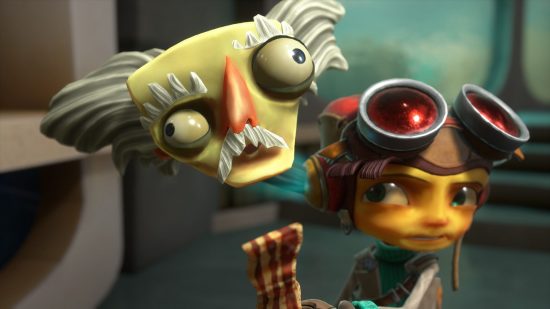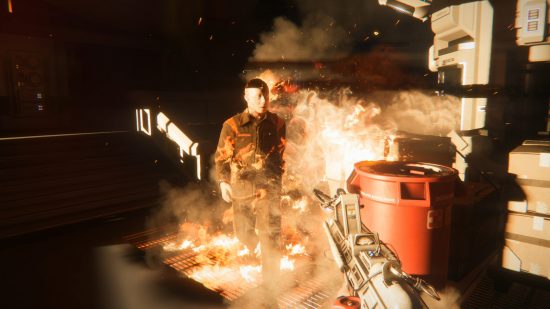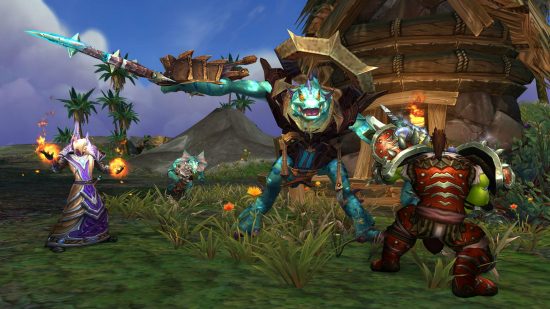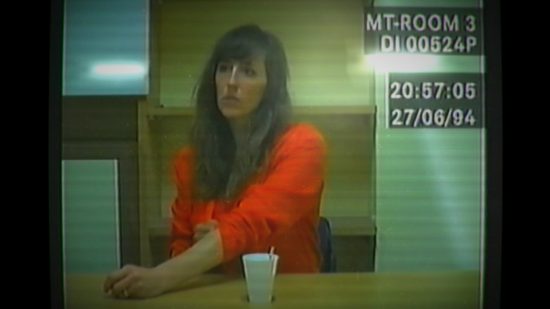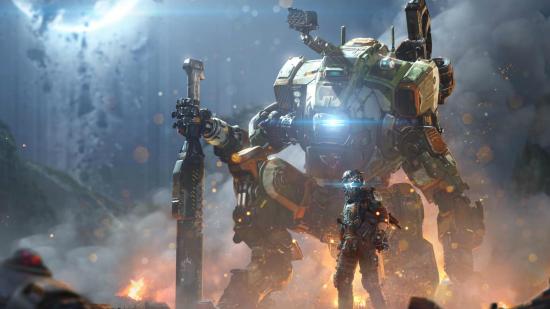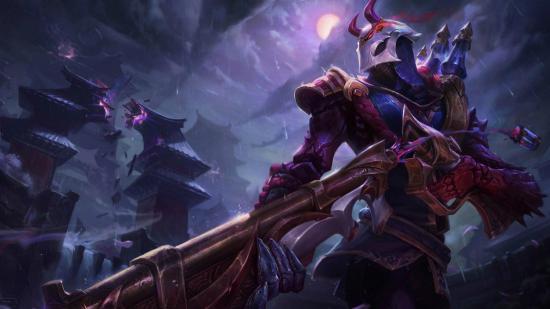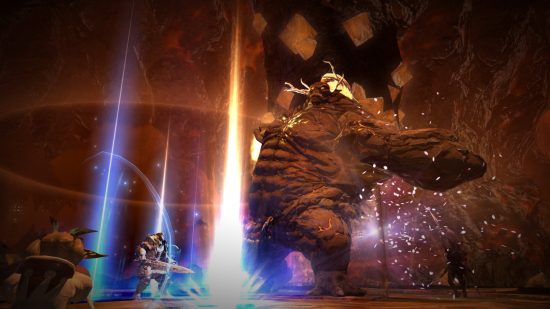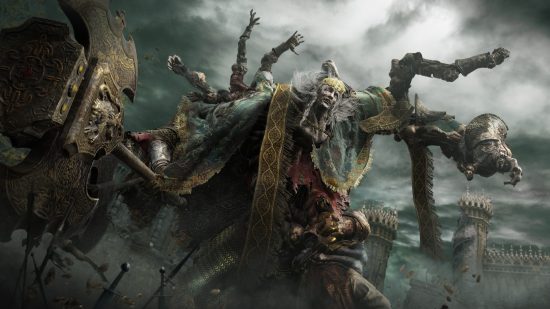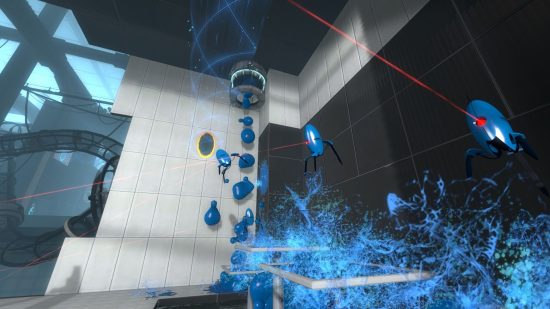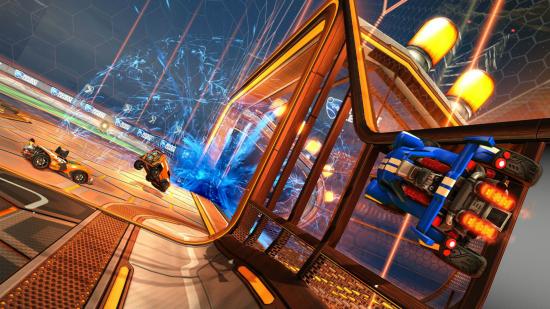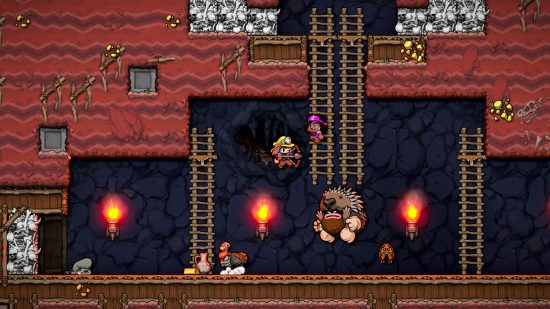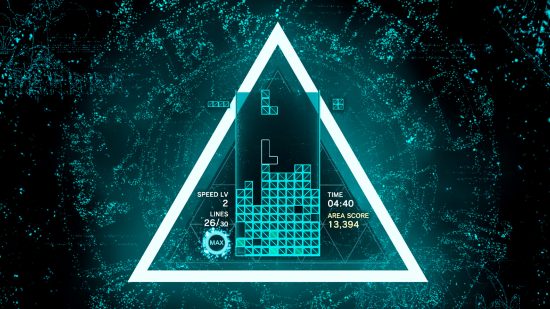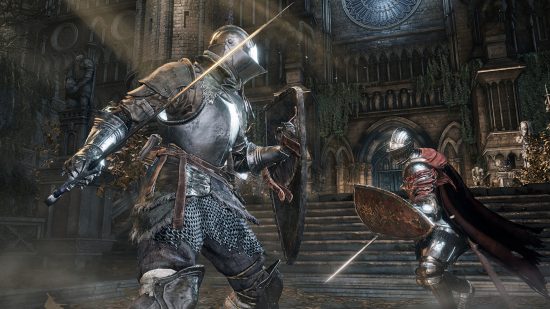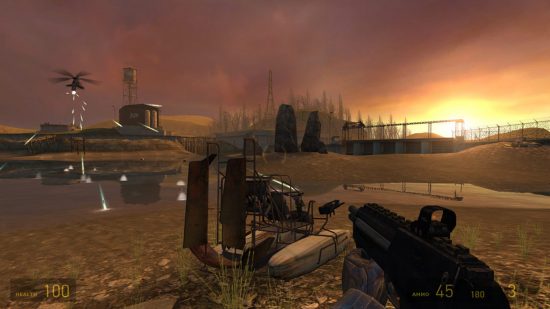What are the best PC games? From triple-A world-beaters like GTA 5 to enchanting indie releases such as Rocket League, these classics are the biggest games across Steam, Epic Games Store, and more.
Finding the top PC games is no easy task. There are, you may have noticed, quite a lot of them. From the 50,000-plus Steam games to… all those other platforms you love so much, there has never been more choice available to the discerning PC gamer. From the best RPG games to the most mind-blowing FPS games, here are the best PC games of all time, according to us. There are even some free PC games thrown in there, too.
Here are the best PC games, in our opinion:
- Pacific Drive
- Like A Dragon: Infinite Wealth
- Persona 3 Reload
- Street Fighter 6
- Alan Wake 2
- Baldurs Gate 3
- Diablo 4
- Valorant
- Half Life: Alyx
- Spider Man Miles Morales
- Inscryption
- Monster Hunter Rise
- Outer Wilds
- Hades
- Total War Warhammer 3
- Slay the Spire
- Dishonored 2
- Deathloop
- Red Dead Redemption 2
- XCOM 2
- Grand Theft Auto 5
- The Witcher 3: Wild Hunt
- Stardew Valley
- Hitman
- Psychonauts 2
- Alien: Isolation
- World of Warcraft
- Her Story
- Titanfall 2
- League of Legends
- Final Fantasy XIV
- Elden Ring
- Minecraft
- Portal 2
- Rocket League
- Crusader Kings 3
- Spelunky 2
- Tetris Effect Connected
- Dark Souls 3
- Half Life 2
Pacific Drive
Take a journey through the radiated Olympic Exclusion Zone in the only vehicle available, a beaten up, hunk of junk, station wagon. The zone is filled with plenty of horrors and creepy crawlies, fortunately, your car is here to protect you. As you drive through this terrifying area, you’ve got to piece together evidence that shows how this area came to be and who caused this destruction.
Your journey should contain a few stops to gather materials and other helpful resources to bolster your vehicle. By the end of the game, the relationship you have between you and your car is going to be determined by how well you treated it with the latest upgrades. Give our Pacific Drive review a read to see what we thought of this impressive indie game.
Like A Dragon: Infinite Wealth
By embracing turn-based RPG mechanics, Like A Dragon: Infinite Wealth perfectly blends serious Yakuza crime drama and a surreal fever dream. One minute, you are getting to the bottom of the disappearance and sudden emergence of Ichiban’s mother. The next, you’re cycling through the Hawaiian streets, collecting burgers in the street to be a more efficient DoorDash, or phoning up “Poundmates” to summon a lobster and hermit crab to attack an enemy.
Our Like A Dragon: Infinite Wealth review calls it “the end result of two decades of iteration” and developer Ryu Ga Gotoku’s “best game yet”. Those just starting should check out the new Infinite Wealth jobs system, as well as our guide to all that Infinite Wealth Dondoko Island has to offer.
Persona 3 Reload
2024 has been an excellent start for fans of JRPGs, and Persona 3 Reload is just one of them. Its story mixes impressive writing with sincere heart and soul in its themes of loss and dealing with the consequences left behind by others. Reload’s most remarkable feat, as mentioned in our Persona 3 Reload review, is just how streamlined the battle system gets, making it more playable than ever.
Despite all the changes, the one thing Reload maintains from the original is its sense of style. No RPG, not even the other games in the Persona series, has quite the same level of coolness about it. It’s on Game Pass, too, so it’s well worth a look if you’re vaguely intrigued. Oh, and we have the new Persona 3 Reload class answers, should you need them.
Street Fighter 6
Capcom’s hot streak continues as they release yet another scorcher. This time, it’s Street Fighter 6 that has been incredibly popular among the game’s usual hardcore audience, and it’s managed to reach a new set of fans thanks to its casual approach. Street Fighter 6 includes the usual 1v1 fighting mode the series is known for, but now there’s a 15-hour story mode for players to learn the mechanics and brush up on their Street Fighter lore.
The fighting side of Street Fighter 6 has never been better, featuring the Drive Bar, which incorporates several new and returning mechanics. Not only is the classic parry back, but players also have access to Drive Rush, a new technique that lets fighters cancel specific moves, leading to spectacular combos. Check out our Street Fighter 6 review to see why we awarded this game a 9/10. We also have a Street Fighter 6 tier list if you’re wondering who to main first.
Alan Wake 2
Alan Wake is a familiar name in gaming, following the success of the 2010 psychological thriller game in which he was introduced to us. The first game had an expansion, American Nightmare, and a remastered re-release, but all fans have wanted for the last decade was a sequel to the Remedy game.
Announced during The Game Awards 2021, the Alan Wake 2 release date arrived in 2023, where we find Wake rotting away in the Dark Place. At least we know where he’s been all this time. As we explain in our Alan Wake 2 review, a lot of the new game doesn’t take place with Wake in the Dark Place; we take on the role of the new character Saga Anderson, an FBI agent uncovering the dark secrets of Bright Falls. Switch between the two characters as you progress through this unique story game and uncover the link between Bright Falls, the Dark Place, and the novelist himself.
Baldur’s Gate 3
Larian’s reputation as one of the best developers around was solidified with the release of Divinity: Original Sin 2, but if you had any doubts, Baldur’s Gate 3 is sure to cement its place. Built upon the foundations of Dungeons and Dragons fifth edition ruleset, BG3 lets players use their creativity to solve problems, accomplish tasks, and set goblins on fire.
A lot of games promise this level of depth, but BG3 is designed to continue even if the player decides to kill every useful NPC around. In this 70-hour epic, the story will adapt to your actions, even if you murder fan favorites like Astarion and Karlach. Read our BG3 review to see why we gave this incredible game an excellent score of 9/10, and don’t forget to check out our Baldur’s Gate 3 builds guide if you want to design your character from scratch.
Diablo 4
Darkness has overtaken Sanctuary once more. Hatred’s poisonous tendrils have corrupted its people, demons of all shapes and sizes roam the land. Blood soaks the very earth beneath our feet, and Lilith is poised to reign supreme. This is Diablo 4, the best Diablo game ever made.
As noted in our Diablo 4 review, our hero’s story is a twisted tale of tragedy and loss that sinks its hooks into you from the get-go. But while we wait for the Diablo 4 DLC, Vessel of Hatred, to continue Sanctuary’s saga of strife, Blizzard keeps things fresh with new seasonal updates that have included everything from vampires to bizarre, spider-like robots. Oh, and also Gemma Chan.
Diablo 4’s story is far from over, and Hatred is far from eradicated. Now is the perfect time to dive into one of the best stories in gaming – but will you dare to do so? Lilith is waiting.
Valorant
The Counter-Strike series has sat unchallenged as the pinnacle of competitive FPS games since its inception, featuring shooting mechanics that reward mechanical skill above all else, a weapon economy that provokes constant strategic reshuffles, and perfectly balanced maps. Valorant, from Riot Games, does all of that while mixing in a roster of heroes, each with passive, active, and ultimate abilities. Some of those abilities have Counter-Strike counterparts, like smokescreens, flashes, and grenades, but there’s nuance to how each Agent’s kit works that ensures every round plays out differently.
Valorant may not win over the FPS purists, but it’s infinitely more accessible and offers new players an inroad that doesn’t involve being good at clicking on heads. And if you are one of those new players, then allow us to help you out with a guide to all the Valorant characters, a ranking of them in the form of a Valorant tier list, and a helping hand getting used to the gun, spray patterns, and Valorant crosshairs so your shots will always be on target.
Half-Life: Alyx
Okay, so maybe a VR game wasn’t what we all had in mind when Valve announced its first new Half-Life game since the long-abandoned Half-Life 3, but Alyx isn’t just an incredible Half-Life game. It also – finally – validates the years of VR hype.
The scope is certainly smaller than the main Half-Life games, but whereas missions in Alyx will often take place in a single building, the level of interaction available to you far exceeds even that of the Gravity Gun. Whether that’s in flashy moments like using a wooden beam to play baseball with enemy grenades or simply sweeping clutter off shelves in search of extra ammo. It’s got that good game feel, just like a shotgun blast in Doom or Mario’s “wahoo!” but this time, it makes you feel as much a part of City 17 as the looming Combine ships. You can read our full Half-Life: Alyx review here in case your mind’s not made up yet.
Marvel’s Spider-Man: Miles Morales
The first of Insomniac’s Spider-Man games introduced us to frantic combat and rapid web-swinging through the bustling streets of Manhattan that we’d never seen before in videogames, and the Miles Morales sequel is essentially more of the same but improved in every way. Side filler missions like sneaking through an art gallery as MJ is gone, combat abilities and skills have been given more gusto, and the story is a little shorter to ensure it never dips in quality at any point.
What’s even better is that while Miles Morales is technically a spin-off and, as a result, it uses the same map of Manhattan, it’s set during the festive period, so it automatically becomes one of the best Christmas games, with snow and festive decorations everywhere. The story is all about Miles proving himself as Spider-Man while Peter’s taken a leave of absence, and it’s certainly one of the best superhero games, if not the best.
Inscryption
Very few games blend genres like Inscryption, where a simple card game meets atmospheric horror. Who knew you could feel such tension – or, in our case, existential dread – by placing the wrong card on the table?
Inscryption takes inspiration from the tabletop games you’d see over on Wargamer. Its price tag is a steal, with a compelling gameplay loop that will leave you wanting more. It also packs a story with more twists and turns than an M. Night Shyamalan movie, but the less we say about that, the better.
Monster Hunter Rise
Since coming to PC, the Monster Hunter series has broken new records for Capcom in terms of sales numbers and popularity. Monster Hunter Rise continues this trend, and while it may not be as visually stunning as Monster Hunter World, its new mechanics and Japanese theming are where it shines the brightest. Hunters have many new abilities thanks to the new dog-like Palamutes they can ride and the wire bugs catapulting them into the sky, making even the heaviest weapons immensely fun to wield. There’s no feeling quite like the sheer glee of bonking a Rathalos on the head with a massive hammer.
You can check out our Monster Hunter Rise review to see how much fun the base game is. However, Rise truly shines when you introduce the Sunbreak expansion pack. While the included monsters are the star of the show – the most iconic new designs are based on vampires and werewolves – they’re far from the only noteworthy inclusion. The endgame includes Anomaly Investigations, which have hunters tracking down and slaying monsters infected with parasites that will drain your life if you get hit. Even without the plethora of endgame activities, Monster Hunter Rise and its Sunbreak expansion are some of the most exhilarating experiences in gaming. The Monster Hunter Wilds release date is sometime next year, but if you’ve ever been curious about Capcom’s best-selling series, there’s no better entry point than this one.
Outer Wilds
Forget the sprawling galaxies of Starfield, No Man’s Sky, and Elite Dangerous; if you truly want to get as close as you can to experiencing the wonder of space exploration in a digital form, Outer Wilds is the only choice. It might not offer the sheer scale of other space games, yet it feels the most natural and wondrous of them all thanks to its careful, intricate design and beautifully realized clockwork worlds that tick alongside one another in perfect harmony.
We recognise the irony here in what we’re saying, but Outer Wilds is one of those games where your experience is enhanced if you go into the game without knowing anything about it. Above all else, this is a journey of discovery, whether that be flying your rickety little ship around the galaxy to explore planets and discover new secrets upon each of them, or learning more fundamental truths about the world itself and the laws that bind it in ways that let you explore even deeper moving forwards.
Outer Wilds is all about the journey as you explore several planets with weird and wonderful happenings, including discovering some lost friends who have been resigned to see out their existence on these planets. You’ll be left scratching your head at times, too, because there are plenty of logic puzzles to solve in one of the best games of all time. The brilliant nature of Outer Wilds is truly difficult to explain, though, as it’s an experience everyone should experience without knowing much more going into it, so what are you waiting for?
Hades
The culmination of developer Supergiant Games’ previous works and a close second in our 2020 GOTY list, Hades masterfully adopts the repetitive, run-based nature of roguelike games into a narrative-led format that ensures you always feel like you’re making progress, even on your failed attempts. As Zagreus, the rebellious son of the eponymous Lord of the Dead, you’ll repeatedly attempt to fight your way out of the underworld, alternately assisted and hindered along the way by the various Olympian and Chthonic gods of Greek mythology.
With six weapons at your disposal, each with a variety of unique alternate forms that change their playstyle, and a vast array of god-given powers to supplement your arsenal, no two runs of Hades are quite the same. Along each escape attempt and back at the House of Hades between runs, you’ll chat with the cast and learn ever more about their stories and relationships. It’s funny at times, it’s melancholic at others, and it can even get a little bit sexy.
Like all good roguelikes, beating Hades once is just the start. Not only does the challenge ramp up with its granular, player-controlled heat system allowing you to choose how (and how much) you push yourself, but the story continues building layers upon layers, even after you’ve seen the victory screen dozens of times over. With the Hades 2 release date increasingly imminent, now’s the time to discover what made the first so widely beloved.
Total War: Warhammer 3
Rounding off an epic trilogy of strategy games, Total War: Warhammer 3 brings together the highlights from the previous games in the series into one magnificent conclusion. It’s the culmination of years’ worth of iteration by Creative Assembly, and it’s the ultimate Warhammer Fantasy experience and one of the best Total War games. Seven factions, multiple different campaign types, and online campaign co-op are but a few reasons to take a stroll into the Old World once more, but you’ll stick around for longer than ever, thanks to thoroughly applied polish at every level of the game.
It’s also wildly ambitious, with the sprawling Immortal Empires map encompassing everything that Creative Assembly has ever made for the three Warhammer games. Take a glance at our Total War: Warhammer 3 review for our complete take.
Slay the Spire
We’ve seen other developers try their hand at creating a roguelike deck builder, but no one has perfected the genre like Megacrit’s Slay The Spire. It’s easy to understand all of the deck archetypes for each class, and you can take things to another level when you incorporate Relics. These powerful items contain special buffs that permanently affect your deck.
Relics open up endless deck-building possibilities as you can discover game-breaking combinations, but therein lies the problem. You may not receive the same mixture of Relics and cards in your next 50 attempts, leading you to discover stronger setups than you ever imagined. With 20 difficulty levels to get through, a deadly secret boss at the end of each run, and four unique classes to learn, there’s a good reason why most Slay The Spire players have hundreds of hours logged on Steam. See our PC Slay the Spire review and see why we love this game.
Dishonored 2
Sometimes, in Dishonored 2, you have to kill yourself to save yourself. Playing as Emily Kaldwin, you’re able to cast a ghostly doppelganger at street level and jump down onto its head, plunging your dagger into its neck to break your fall, negating any damage.
Doppelganger’s intended function is to be used as a distraction, a way to escape from a confrontation. But developer Arkane wants you to bend the rules; to see what’s beyond the veil. You’re supposed to experiment, to see what’s possible – and, oh boy, there’s so much you can do if you are inventive enough. There’s so much to revel in; Arkane’s sneaker is one of the few games we’ve awarded a perfect score. Read our Dishonored 2 PC review to find out why we love it so damn much.
You get to play with these systems in Karnaca – a gorgeous, stylized, fictional slice of the Mediterranean. It is one of the most cohesive, story-rich environments in video games, with every room telling a story with its props. Whether you’re slinking across the rooftops or sprinting through, knife-in-hand, it’s a place that begs to be explored as much as your abilities do. If you like your games with both violence and brains, don’t overlook this clever assassination sim. Indeed, it’s one of the best stealth games on PC ever.
Deathloop
First-person shooters have been around long enough that it’s difficult to come up with ways to meaningfully innovate on the formula. Fortunately, there’s Deathloop, which happens to be our favorite game of 2021. You start on a desolate beach as Colt Vahn, vaguely remembering that you’re the head of security for a mysterious North Atlantic island that’s been converted into an eternal playground for the ultra-rich, thanks to a time loop machine that resets time every day and ensures nobody suffers consequences for anything.
It’s Groundhog Day with guns, set in an alternative ’60s full of the chaos that characterized the decade. Experimental Bauhaus art, a scorching funk soundtrack, a set of Dishonored-style special abilities, and massive guns you can dual-wield make Deathloop a terrific shooter. It doesn’t stop there, though: to line things up so that every boss can be taken out in a single day, you’ll have to explore, solve puzzles, and plan carefully – or you can decide to screw up someone else’s run by invading their game as Julianna.
Deathloop is fast-paced and dazzling from beginning to end, and it doesn’t overstay its welcome – while you can invade other players’ games as Julianna until the end of time, the Deathloop campaign wraps up in around 30 hours – and that’s time well spent. If you’re jumping into the campaign for the first time or you need a refresher, check out our Deathloop safe codes and Deathloop glowing items guides. Read our Deathloop review for the full rundown.
Red Dead Redemption 2
In Rockstar’s follow-up to one of the greatest western games of all time – you’ll take on the role of rugged outlaw Arthur Morgan, part of the reckless and depleting Van der Linde gang. As you ride through the merciless fictional US landscape, Red Dead Redemption 2 not only thrusts you into a perilous world in which outlaws are facing extinction, crushed under the accountability of law and order but propels you into a downward spiral of morality versus survival.
Red Dead Redemption’s beauty lies in the imminent fate of the gang and stolen moments around the campfire. Arthur feels a crushing responsibility to rescue and reassure his entire hapless family, even the rotten rogues who appear hell-bent on steering the group toward a cataclysmic end.
Red Dead Redemption 2 is one of those games that will stay with you for many years after the credits roll. From quiet haunts tracking legendary animals and plucking herbs from the side of old railways to moments of desperation where the gang leads a retaliation against rivals, – there’s an immense amount of detail in this world and just as much heart. Check out our Red Dead Redemption 2 PC review for the full verdict. If you get stuck, try our Red Dead 2 cheats, which are sure to get you out of a metaphorical, and literal, bind.
XCOM 2
XCOM 2 is a special sequel. Most gaming follow-ups are iterative improvements on a formula, but this one works to justify its existence by being a different game altogether. Where Enemy Unknown granted you the support of all the planet’s governments and asked you to watch it dwindle, XCOM 2 starts you off with next to nothing: a handful of ragtag fighters of questionable backgrounds fighting against the might of an alien enemy that has already conquered Earth.
This new guerilla perspective produces some of the best tactics the PC has ever seen, and as our XCOM 2 PC review attests, it’s one of the best strategy games in years. Timed missions force hard choices between potentially saving the rookie with your best grenade or the sniper you’ve been fondly upgrading. Cold, cruel decisions like these will bring you success and guilt – only exacerbated by the War of the Chosen DLC, which binds soldiers in relationships just so that it hurts all the more when those bonds are inevitably broken. If you’re struggling to save the human race from those pesky aliens in the expansion, check out our XCOM 2 War of the Chosen guide.
While we’re still nowhere near an XCOM 3 release date, the recent XCOM Chimera Squad is a character-focused game where you’ll be able to play as both aliens and humans and fight against a movement that threatens the new peace in City 31.
Grand Theft Auto 5
There’s a reason GTA 5 still consistently tops the charts and boasts incredible player counts years after its release: it’s still the pinnacle of the sandbox genre, not to mention one of the best PC games of all time. We have had a bunch of other open-world games launch since, but none match the fidelity of GTA 5’s fictional recreation of LA; its sprawling hillsides, the distant Mount Chiliad, its jutting metropolis, and the dusty trailer parks surrounding it all.
It’s a world that calls to you, begging for you to speed across it on a motorbike, weaving between traffic as you go. Plenty of games lure us to the peaks of their mountains, but very few let us then base jump from the mountain’s peak while being chased by the armed forces.
Rockstar’s crime series generally attracts headlines because of its violence, but it’s not the shooting that keeps players exploring its world – it’s the feeling that anything can happen, the Rage engine’s slapstick physics system providing endless entertainment as you barrel down hills or take a clout to the head with the wing of a plane. The fact that you can experience all of this online with friends makes it all the sweeter, and that online portion of the game is now as popular as the main game, boasting rich GTA RP communities who fill in for ordinary civilians as if part of a rich MMO.
The game keeps growing with GTA 5 mods, and if you get stuck, there are plenty of GTA 5 cheats. There’s also news on a GTA 6 release date and a new trailer for the next in the series.
The Witcher 3: Wild Hunt
The best RPGs keep their greatest stories in their side quests, and those in The Witcher 3 contain some of the most memorable and heartbreaking moments in video games.
Its genius lies in how nuanced its characters are. Take the Bloody Baron – when you first meet him, he comes across as a hateful, nasty man with no redeeming qualities whatsoever. You begrudge helping him at all. By the end of his plot, you’ll empathize with him, despite his disgusting character flaws. It’s dark fantasy at its very darkest – an adult game that is actually for grown-ups, full of moments that will stay with you well after the credits roll. Simply put, it’s one of the best PC games ever made, as you’ll find out in our The Witcher 3 PC review.
When the credits do roll, though, you still have two of the best videogame expansions in existence to get stuck into. The first, Hearts of Stone, takes a seemingly innocuous character you meet at the start of the main game and turns them into the most menacing, disturbing adversary you’ve ever seen. The second, Blood and Wine, is almost another game in itself, taking you to the sunny land of Toussaint to combat a growing vampire problem. If you’re looking to lose yourself in another world for well over 100 hours, it doesn’t get better than staring at this beauty’s burnt orange sunsets. Want to make the game even better? Read up on the best The Witcher 3 mods, although we aren’t sure you’ll need to change much.
Stardew Valley
Indie farming games are a dime a dozen these days, but Stardew Valley is the genre’s shining star and absolutely the best place to start. After giving up your dull office job, you move to your grandfather’s farm and take over the reins. It’s not quite as simple as growing crops and looking after animals though, as the quaint village of Stardew Valley is full of interesting characters and mysteries to uncover.
Expanding is just one of the tasks on your list, as you make friends and give gifts to plenty of budding bachelors and bachelorettes, all while helping to restore the community center at the heart of the town, and prevent – or assist if you’d rather – supermarket conglomerate Joja Corp from taking over. Combat is a vital aspect of the game too as you head deeper into the mines, as is fishing and exploring secret areas away from the village itself. Stardew Valley is the ultimate relaxing game, though you may find you blink and several hours have passed. If you fancy spicing up the experience even more, our list of the best Stardew Valley mods will have something for you.
Hitman
If you thought Hitman: Absolution was a misstep, put those worries aside – everyone’s favorite barcode-headed baldie is back on fine form in Hitman.
The Hitman series is full of incredible, tense, and sometimes hilarious missions, and this episodic entry houses some of the best. Sapienza is an instant classic, asking you to take out a mob boss in a picturesque Italian town. In it, you can eliminate your target by popping an explosive golf ball into their caddy sack and watching them take a swing at it.
Whether you’re drowning folk in a toilet or carefully lining up a sniper shot in time to some fireworks, Hitman is full of inventive ways to dish out death. Each mission is designed to be played over and over again, begging for you to approach it in myriad ways. As you’ll discover in our Hitman PC review, you can spend days mastering each; there is that much to do. If you want murder in your games to be more meaningful, flex your fiber wire and grab Hitman by the throat.
The sequels, both Hitman 2 and Hitman 3, don’t do much to excel the formula, but with several new sandboxes for you to murder your way through, it’s well worth picking them up if you enjoy the first game. Check our guide to the Hitman timeline to see the full story of Agent 47.
Psychonauts 2
New, big-budget 3D platformers are an increasingly rare sight in gaming, but Double Fine’s return to a cult classic makes us pine for the genre’s heyday. It’s a sequel that improves on practically every aspect of the original, with sharper movement, more varied combat, and most importantly, a story that uses its setting and conceits to say some insightful, important things about mental health.
Every level is based inside a character’s mind, providing completely different types of gameplay in each instance. In one, you might find yourself inside the head of a doctor with a gambling addiction, trying your luck at casino minigames to access the high-roller suite and set things right. In another, you take on an Overcooked-like cooking show challenge on behalf of someone whose fear of judgment is ruining their life. They’re tonally, aesthetically, and narratively consistent – and they’re always a ton of fun. Check out our glowing Psychonauts 2 review for the full verdict.
Alien: Isolation
If you’ve ever watched Ridley Scott’s horror film Alien and thought, ‘I’d love to be inside that movie’, then Alien: Isolation is your golden ticket, also, you might need to talk to someone professionally. Creative Assembly’s survival horror game replicates the world of Wyland Yutani and xenomorphs with astonishing attention to detail, right down to the computer terminals that flicker and hum as if it were 1979 all over again.
But Isolation’s pitch-perfect recreation of the movie’s setting and era is only part of what puts it among the best PC games. The real triumph is the xenomorph itself: a solitary, unstoppable beast that stalks you incessantly on your journey through the game.
What makes it truly remarkable is the adaptive AI system, which means it’s constantly learning – if it discovers you hiding in a vent, it’ll begin to search vents during subsequent encounters. This turns the creature into a true menace, keeping tension levels high both during play and long after you have shut down your computer. Read our Alien Isolation review, and if you have nerves of steel, you can hook up Isolation to Oculus Rift for one of the best VR games on PC you’ll ever play. And looking ahead we can only dream of Alien Isolation 2.
World of Warcraft
One of the only subscription MMOs to get it right, and always capable of a resurgence in popularity and quality, World of Warcraft is an easy recommendation. Its Warlords of Draenor low point left many wondering if there was still a future for one of the most famous games of all time. Fortunately, recent expansions have shown that it’s still alive and well, and it’s not going away any time soon. No matter what you’re logging on for, it remains one of the best PC games around.
Each expansion provides a massive, co-op-enabled RPG storyline of its own, with only the most climatic moments requiring the presence of other people. Of course, if you want to delve into the endgame and join 24 others in taking down the world’s biggest bads, all that is there as well. World of Warcraft raiding remains amazing, while constant updates and a solid content plan make it one of the best MMOs on PC.
If WoW appears too daunting you can play it in its base form with World of Warcraft Classic. In our WoW Classic review, we call it “a well-implemented redux of a moment in time, which may surprise you with its engaging focus on leveling and the friendliness of its players”. If you’re looking to get off to a quick start, then our WoW Classic leveling guide or WoW classes guide will be all the prep you need.
Her Story
We all love a good mystery, but Her Story is one of the finest minimalist detective games out there. Your task is to comb through the short videos of seven police interviews with Hannah Smith, a woman whose husband has gone missing. FMV games are heavily reliant on the performance of its actors, and Viva Seifert expertly misleads, distracts, and ultimately charms her way through each interrogation, as our Her Story review explains.
By navigating tags made up of words that link each video on the database, you soon start to paint a picture of the events of that fateful evening. The gameplay is simple, just entering words into a search engine and watching clips. However, invest some time into working out the puzzle, and you’ll soon be hooked, skimming through the archive footage like a real detective.
Titanfall 2
It doesn’t matter how many of the best FPS games you’ve played – if you haven’t beaten Titanfall 2, you haven’t seen it all. Its short but explosive campaign delivers fresh ideas and mechanics with each act, a real masterclass in level design. The pace and freedom of its combat and parkour manages to feel at once effortless and exhilarating, and your mech companion BT-7274 is the best buddy a soldier could ever ask for.
While the Titanfall 2 story mode is more than reason enough to pick it up, Titanfall 2 also boasts one of the best multiplayer games around. Its blend of human players and AI grunts means that you can always find targets to take down, even if you aren’t a leaderboard-topping kill machine, and the Titan mechs add a unique dynamic to the battlefield that changes up the pace without completely dominating on-foot players, giving it an edge over even Respawn’s fellow in-universe battle royale game Apex Legends.
League of Legends
Trying to decide which is the best MOBA is an argument that could rage on for hours, but League of Legends is a pretty good place to start. Since its release in 2009, it has become a global phenomenon, consistently one of the most-played games in the world, and at one point had a player base of more than 100 million.
Easier to grasp than Dota 2 but mechanically deeper than Heroes of the Storm, LoL hits a sweet spot in terms of approachability while still managing to constantly evolve. New and updated champions arrive on the Rift several times a year, keeping the game fresh despite its age. Every one of the best LoL champions is unique, too. From ancient gods to pirates and even monsters from another world, there is a way to enjoy the game no matter what you’re looking for.
Final Fantasy 14
The “critically acclaimed MMORPG Final Fantasy 14” has become a long-running meme at this point, but with good reason. It’s been ten years since Square Enix reinvented FF14 with A Realm Reborn, and since then we’ve been through four fabulous expansions, each building more upon its best-in-class world, characters, and story. The FF14 Dawntrail release date in July 2024 kicks off a completely new adventure, meaning there’s never been a better time to start playing.
In even better news, the recently expanded free trial for FF14 now lets you play the full base game and its first two expansions, Heavensward and Stormblood, without paying a single penny. That’s hundreds of hours you can enjoy for free, and if you decide to sign up after that, you’ll have two of the most compelling and emotion-packed adventures going before jumping into Dawntrail.
With a wealth of FF14 races to choose from and the ability to play as all FF14 classes on a single character, there’s an astonishing amount of variety on offer. Square Enix does an excellent job of ensuring older content stays relevant and interesting, and it recently finished adding the ability to complete all the main story dungeons with AI companions if you prefer to play solo. That said, with the game’s Xbox debut earlier this year, you’ll have no shortage of newcomers to play alongside – not to mention perhaps the most friendly and welcoming MMO community you’ll find.
Elden Ring
FromSoft’s Souls series has established itself as one of the all-time great series of the past decade in gaming, but its reputation for difficulty has probably scared off at least as many potential players as it has drawn in with its moody, mournful worlds and esoteric narratives. While Elden Ring doesn’t break from Souls’ traditional challenge, it offers a far more welcoming experience thanks to its vast open world – the first of its kind for the studio.
And what an open world it is. Elden Ring’s The Lands Between is a revelation: it stretches for miles but never feels empty. Each area is packed with new enemies to outwit, ancient tombs to uncover, weird characters to meet, and fantastical Elden Ring bosses to die fighting again and again and again until you can finally bring knowledge and execution together and emerge victorious. Each of Elden Ring’s zones includes a ‘legacy dungeon’ that feels more akin to the more linear do-or-die levels of the Souls games, but each one merits revisiting to find the secrets hidden deep within.
But if, for example, a stray dragon guarding a lake is proving too difficult, you can always head off and explore somewhere else. You’re only ever given suggestions, and you’re always free to head off on your own to learn more about the world and grow stronger simply by following your sense of curiosity and adventure or trying out different Elden Ring builds.
Elden Ring is a great game when considered on its merits, but it’s also an important game: its approach to open-world game design plots a new course for the genre toward a world in which repeatable, cookie-cutter activities and endless map icons are relics of the past. There’s no seasonal reward track to follow because playing Elden Ring is the reward – and that’s more than enough. That said, if you are looking for even more Elden Ring content, don’t forget about the Shadow of the Erdtree release date, which is set to launch sometime this year. Check out our Elden Ring review for the full verdict.

Minecraft
What’s not to love about Minecraft? There are many reasons the blocky survival game is one of the most beloved and well-known games of all time, and among them is the simple fact that you can do almost anything within Mojang’s world.
In simple, vanilla terms, Minecraft allows you to explore an infinite world filled with colorful biomes, treacherous realms, and mythical creatures – both hostile and friendly. Crossing genres, Minecraft dabbles in survival, crafting, building, PvE, adventure, and more, has a story and an ‘endgame’ boss, and then delivers hours upon hours more content by welcoming you to another realm and leaving your world open to explore more fully. Both peaceful and terrifying, it’s hard to think of another game that offers quite as much as Minecraft does without feeling cluttered or overcomplicated. Depending on your requirements, you can also choose to make monsters peaceful, which is perfect for young kids, or just play around in creative mode.
Even without modding, then, Minecraft is a masterpiece. However, if you happen to get bored with the vanilla game – and Mojang Studios’ huge annual content updates – you can turn Minecraft into an entirely different experience. Minecraft shaders alone just make the game look stunning, while Minecraft maps give creators a platform to show off their talent, turning the crafting game into a puzzle game or a horror game, for example. Remaining Minecraft mods do pretty much anything else you can think of, adding new Minecraft mobs to interact with, troubling you with new quests, turning the game into an RPG, or delivering new biomes to explore. And let’s not forget that you can play with friends, or make new ones in one of the hundreds of popular, safe, and successful Minecraft servers. Again, what’s not to love about Minecraft?
Portal 2
Barring the inadvertent, buggy slapstick of a Fallout New Vegas, or the spontaneous antics in online hits like Lethal Company, it’s not often you get a videogame that is genuinely funny. Tonally, Portal 2 is the equivalent of a razor sharp, universally appealing Pixar movie – whether you’ve played games or haven’t, whether you like them or don’t, Portal 2 will successfully win you around, and make you laugh in the process.
On the contrary, comparing it to any film feels redundant. Valve created something that would be impossible to replicate beyond the form of videogames, where the punchy, satirical, and occasionally somber and dreadful world of Aperture Science can only spring to life through your (increasingly involved, always rewarding) interactions.
It’s clever without pretension, unique without obfuscation, and simultaneously playful and mature. A lot of videogames make this claim, but Portal 2 might be the only one to comprehensively fulfill it – there is something in here for everyone.
Rocket League
It’s difficult to describe anything as truly perfect, but Rocket League comes very close. A smart evolution of the ‘soccer with rocket-powered cars’ concept debuted in Psyonix Games’ previous game, Rocket League is one of the best multiplayer games you could imagine. It’s easy to pick up and immediately a delight to play whatever your skill level, but with an almost unlimited ceiling to master at the high end of competition.
Whether you opt for the intense back-and-forth of 1v1 and 2v2 matchups, the teamwork focused 3v3 mode, or the sheer chaos of 4v4, Rocket League brings thrills and spills galore. At its entry level, it’s akin to those gleeful playground scrambles, all your cars clustering around the ball and desperately shoving and shunting one another to try and get a touch in. At its peak, it’s one of the most precise, demanding, and high-speed sports games you’ll ever play. And if you want to take those first steps to greatness, our Rocket League tips will get you ready for kick-off in no time.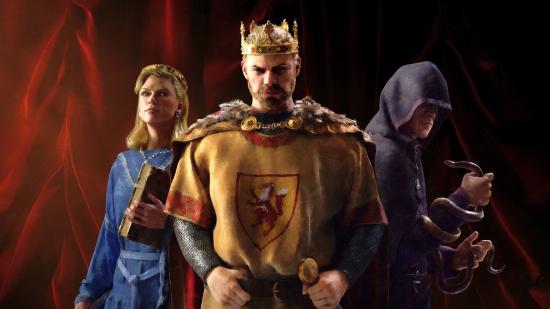
Crusader Kings 3
We like Crusader Kings 3 a lot. Paradox’s grand strategy game takes every facet of medieval dynastic life and lets you mess around with it to no end. From declaring war on children to finding out one of your court members is a cannibal, this is a Dark Ages tragedy simulator. Our Crusader Kings 3 review can tell you how it’s a fantastic grand strategy game – and an even better RPG – to get into if you’ve never tried one before, and yet it also picks up where Crusader Kings 2 left off, for long-time CK fans. An updated UI, a more comprehensive tutorial, and even more ways to tinker with your kingdom and interact with other leaders we couldn’t ask for much more from a Paradox game.
If you’re looking for a PC game that teaches you a little about the customs of Europe and Northern Africa before you ruin them as much as you like, this game is for you. With CK3 mods already pouring in, you can also be sure that you’ll never run out of new ways to approach the life of a medieval ruler. Check out our Crusader Kings 3 beginner’s guide for help starting in the sometimes-bewildering genre.
Spelunky 2
Just when you thought this roguelike game couldn’t get any better, Spelunky 2 sticks to its hardcore roots to create a long-awaited sequel for its dedicated community. Spelunky 2 takes players on a deadly journey in search of treasure, but you need to keep your eyes peeled for hidden traps, as the world wants nothing more than to stop you in your tracks. This game is a roguelike in the truest sense of the term, forcing you to go back to square one as soon as you make the tiniest mistake. That’s part of what makes Spelunky 2 so addicting to play; it’s exciting to explore new parts of the game while overcoming sections that you once felt were impossible to get through.
After you’ve finished the main set of levels of Spelunnky 2, you can attempt to go on a Cosmic Run, which is designed to test your spelunking skills. Do you have what it takes to ascend to the astral plane and become a star constellation? Spelunky 2 ramps up the carnage by introducing cross-play co-op, giving you and up to three friends the chance to complete a campaign together. While you might think adding more people should make the game easier, you need to try it to understand why things become so tricky.
Tetris Effect: Connected
Created by Tetsuya Mizuguchi, the video game designer behind Lumines and Rez Infinite, Tetris Effect is known best for its incredible journey mode. Fly in hot air balloons above the desert, swim in the ocean surrounded by sea creatures, and take a trip through a dense forest in this impressive single-player campaign.
The best Tetris game ever made just got better with Connected, a free expansion that adds cross-platform multiplayer and cooperative modes to the puzzle game. As the name implies, up to three friends can connect as they fight against AI-controlled bosses. Using the Zone mechanic, players combine their screens to create one super-sized Tetris board, granting you the ability to fire off massive amounts of garbage lines. If you’re feeling competitive, you can play a modern version of Battle Tetris using the zone mechanic or rewind the clock with classic NES rules.
The PC version of Tetris Effect: Connected is as good as it gets, featuring optional VR support, support for ultra-wide aspect ratios, and an uncapped frame rate.
Dark Souls 3
We have quite the soft spot for the series that perfected Souls-like games. All three Dark Souls games have something to offer, but Dark Souls 3 feels the most complete. Not only does it have the most refined combat, but several bosses are widely regarded as the best fights in the series. One such bout is against the Nameless King who rides in on a dragon, throwing thunderbolts before dismounting to pierce you with his spear. Both DLC packs have some iconic bosses that, in the case of Slave Knight Gael, outshine just about everyone else.
On top of that, the designs for each area are an eclectic mix of new brutal and devilishly difficult locales, and familiar haunts we’re returning to, but with a more sinister makeover. Its many items that you find scattered throughout the open world tell stories that explain just why the world is in such a sorry state. The entire seriesis worth playing, but if you only wish to experience the very best, Dark Souls 3 is top of the pile.
Half-Life 2
Ignoring for a second its environments, its characters, and all of its wonderful aesthetic details, what Half-Life 2 managed to create was an almost perfect chemistry between action and story, and videogame developer and videogame player. The fact it did this in 2004, before BioShock, The Last of Us, Red Dead Redemption 2, or any of the modern, acclaimed narrative adventures, is testament to what was once Valve’s visionary game-making ability.
Set pieces are intricate, original, and entertaining. The pace is electric, pushing you from City 17, to the canals, to Ravenholm, the coast, Nova Prospekt, then back to the city for a spectacular finale. And virtually every aspect of Half-Life 2 feels pored over and refined. It’s a supremely enjoyable game to play, but your expression and your fun as a player never comes at the cost of the game’s integrity, and its creators’ intentions. Two decades later, Half-Life 2 still feels groundbreaking.
There we have it, the best PC games you can buy today. While we impatiently wait for The Witcher 4 release date and Half-Life 3, why not read up on some of the most exciting upcoming PC games headed to a rig near you? Alternatively, here’s our round-up of all the new PC games worth checking out. To be honest, the above masterpieces could easily last you a lifetime, so perhaps you never need to play a new release ever again.
Additional contributions by Paul Kelly and Ed Smith.
